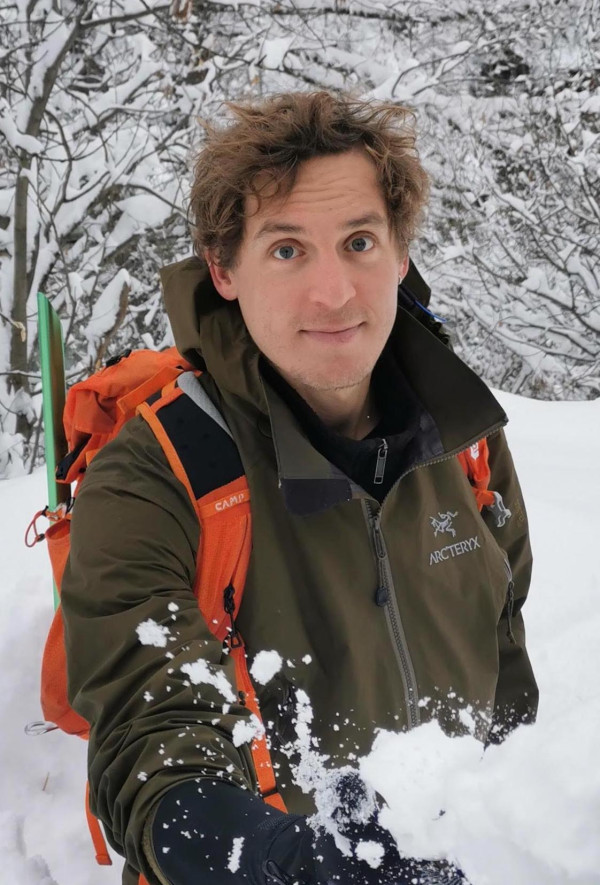Leonid Kahle
Interview by Nicola Nosengo, NCCR MARVEL, September 2023
What was your role in NCCR MARVEL, and what did you focus on at the time?
I was in the group of Nicola Marzari as a PhD student from 2015 to 2019. After getting my PhD I stayed as a postdoc for 5 months until May 2020. My primary focus was researching lithium-ion electrolytes, that are used in lithium-ion batteries to transport ions from anode to cathode and back. They have a couple of very important functions in the battery. Electrolytes have to transport lithium very fast but block electrons. They must not degrade and display the right mechanical properties. The goal was to find some models to describe their physics, especially lithium-ion diffusion. We derived and implemented those models and then launched a high-throughput effort, basically tapping public databases for all known materials that are out there, to try and find better ones. The final part of my PhD and postdoc meant working more with experimentalists on device integration. We had to perform additional simulations to see how they could be used in actual devices.
What was your path after leaving MARVEL?
I worked first for IBM research, where I was halfway between academia and industry, working in the group of Teodoro Laino. That job took me to a very different field, that of Natural Language Processing, and I got also into deep learning, working on complicated neural-network models. I stayed for one year and then I found my current position, which is a permanent one.

How can you describe your current job?
It is even further away from pure research, but I still do very complex problem solving — I just do it on a wider range of topics. The company I work for focusses primarily on atomistic simulation for industry clients. I have projects that involve calculating the specific properties of specific materials, like the bandgap. However, I was hired to develop the company’s capabilities in a very different field, that of phase field simulations. The goal is to integrate atomistic simulations with a description at a much larger length and time scale of systems. These are codes that you can use for example for entire car parts, to see how they bend and all that. I am the product manager of that product that we are still developing and that we plan to release soon. I am also involved in projects on atomistic simulations and on machine learning.
How did the MARVEL experience prepare you for this position?
I can’t see my career path without it. The basis of everything that happened is in my PhD with MARVEL. What I learned there as a scientist prepared me extremely well for my current position. My job is still a scientific one. While we are working with clients. The thought process is very similar to the one you use for writing a paper. In fact, we often write papers with customers. The difference is that the problem comes from an industry application and not from the scientific community. I owe everything to MARVEL in that respect. It was a very good school because it focused a lot on collaboration. In my current job it is very important to work well with people from very different domains and to explain findings in a language that people from different backgrounds understand. I am still not good at that, but MARVEL helped me a lot to skip the science lingo and simplify things just enough for industry clients to understand the value of what we do.
What advice would you have for young researchers who are considering a career in industry?
The most important advice I have is to stay very open minded, not be afraid to learn new things, though it can come at a certain cost. When you do it, you must let go of skills you have become an expert in, in order to move on. That is very hard to do. Going into a new field can feel as if you are saying that what you’ve learnt so far is useless. That is not the case because you can normally transfer a lot of your previous knowledge to a new task. But I see that a lot of my former colleagues are fixated on the idea that because they’ve only done atomistic simulation so far, they can do nothing else. Let go of that fear, you can learn new things very fast. A PhD is the perfect school to teach the art of learning rather than a specific skill.
A second advice is to just be happy to go out there and talk to people. It’s usually called networking and for some people it comes with a bad connotation. Just try to find people you won’t be afraid to ask a favor to later. Make connections and stay in touch with people, don’t close yourself in. This will help you later if you need advice or if you need someone to check your CV or to put you in touch with someone. Because I had such a network, I always knew where I was going in my career, and that helped a lot.
